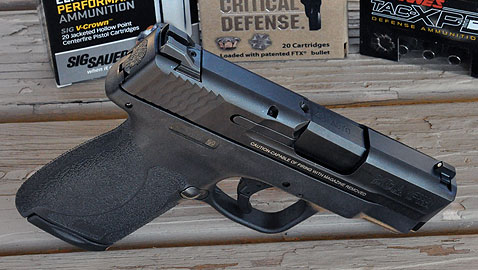 It’s about time. Fans of the .45ACP cartridge have been waiting some time for Smith & Wesson to present them with a Shield pistol chambered in their favorite defensive round. After all, the .45 version of the M&P full size and compact pistols has been available almost from the beginning of the M&P lineup. So where was the .45 Shield? While I can’t answer that, I can say this new sub-compact pistol is well worth the wait.
It’s about time. Fans of the .45ACP cartridge have been waiting some time for Smith & Wesson to present them with a Shield pistol chambered in their favorite defensive round. After all, the .45 version of the M&P full size and compact pistols has been available almost from the beginning of the M&P lineup. So where was the .45 Shield? While I can’t answer that, I can say this new sub-compact pistol is well worth the wait.
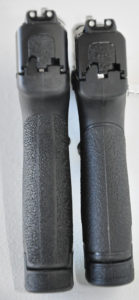 While you might expect the .45 Shield to be larger and less concealable than it’s 9mm cousin the difference is slight. The .45 is just a tiny bit taller, wider and longer than the 9mm Shield but not so much that it’s noticeable. If you have a 9mm Shield holster you might find the .45 Shield fits – a bit snugly – but it will fit. If you happen to have a holster for the Springfield XDs you will likely discover the .45 Shield is a perfect fit.
While you might expect the .45 Shield to be larger and less concealable than it’s 9mm cousin the difference is slight. The .45 is just a tiny bit taller, wider and longer than the 9mm Shield but not so much that it’s noticeable. If you have a 9mm Shield holster you might find the .45 Shield fits – a bit snugly – but it will fit. If you happen to have a holster for the Springfield XDs you will likely discover the .45 Shield is a perfect fit.
While you might expect the .45 Shield to be a lot heavier than the 9mm Shield the fact is the difference, again, is barely noticeable. The bare weight, unloaded with no magazine, of the 9mm Shield is 18.2 ounces and the .45 Shield comes in at 20.3 ounces on my scale. The carry weight of the 9mm with 8 rounds on board is 23.6 ounces while the .45 Shield comes in at 28 ounces with 7 rounds in the extended magazine and one in the chamber. Putting that in perspective, the .45 Shield comes in right in the middle, all up, between the 9mm Shield and one of my Colt Lightweight Commanders that weighs 32 ounces with 9 rounds on board. What you have here is a .45ACP carry pistol that is small, reasonably lightweight and easy to carry concealed.
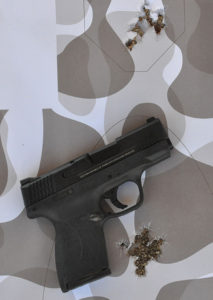 While you might expect a small, lightweight .45 caliber pistol to be hard to shoot you would be wrong. You might anticipate lots of muzzle flip and recoil and you would be justified in believing this little pistol bites at both ends but that hasn’t been my experience. Through several range sessions I have been pleasantly surprised with how this little cannon shoots. With a very manageable, crisp 6 pound trigger and sights that are dead on for my eyes, I really enjoy shooting this pistol. Sadly, as I’ve gotten older and developed arthritis in my hands my enthusiasm for shooting small, powerful pistols has waned. Even so, I experienced no discomfort in shooting the .45 Shield with everything from GI ball ammo to hot defensive loads. Speaking of loads, there are plenty of good ones suitable for defensive use but I think I would pick the Hornady Critical Defense round for this pistol because it felt just right and hit exactly where I was aiming. After a couple of hundred rounds of mostly defensive ammunition fired through the Shield I’m pleased to report there was not a single malfunction. One of my Gunsite instructor compadres reports having fired 500 rounds through his .45 Shield without a hitch.
While you might expect a small, lightweight .45 caliber pistol to be hard to shoot you would be wrong. You might anticipate lots of muzzle flip and recoil and you would be justified in believing this little pistol bites at both ends but that hasn’t been my experience. Through several range sessions I have been pleasantly surprised with how this little cannon shoots. With a very manageable, crisp 6 pound trigger and sights that are dead on for my eyes, I really enjoy shooting this pistol. Sadly, as I’ve gotten older and developed arthritis in my hands my enthusiasm for shooting small, powerful pistols has waned. Even so, I experienced no discomfort in shooting the .45 Shield with everything from GI ball ammo to hot defensive loads. Speaking of loads, there are plenty of good ones suitable for defensive use but I think I would pick the Hornady Critical Defense round for this pistol because it felt just right and hit exactly where I was aiming. After a couple of hundred rounds of mostly defensive ammunition fired through the Shield I’m pleased to report there was not a single malfunction. One of my Gunsite instructor compadres reports having fired 500 rounds through his .45 Shield without a hitch.
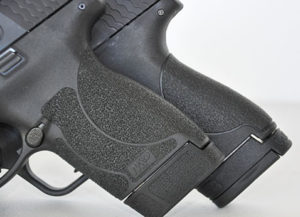 Smith & Wesson made a few changes to the .45 Shield as compared to the 9mm version. The most obvious is the surface texturing of the grip that’s been done in a more aggressive stippling pattern reminiscent of stingray or sharkskin. Sharp enough to secure a grip while not being abrasive; this is an excellent gripping surface. The wavy cocking serrations on the rear of the slide are repeated in an abbreviated version at the front of the slide. While this separates the .45 Shield from the 9mm visually I’m not sure these little serrations have any utility. So far, Smith & Wesson lists only two variations of the Shield .45; those with and without a thumb safety. I imagine, as with the other Shields in the lineup, various sights and other options will be offered in due course.
Smith & Wesson made a few changes to the .45 Shield as compared to the 9mm version. The most obvious is the surface texturing of the grip that’s been done in a more aggressive stippling pattern reminiscent of stingray or sharkskin. Sharp enough to secure a grip while not being abrasive; this is an excellent gripping surface. The wavy cocking serrations on the rear of the slide are repeated in an abbreviated version at the front of the slide. While this separates the .45 Shield from the 9mm visually I’m not sure these little serrations have any utility. So far, Smith & Wesson lists only two variations of the Shield .45; those with and without a thumb safety. I imagine, as with the other Shields in the lineup, various sights and other options will be offered in due course.
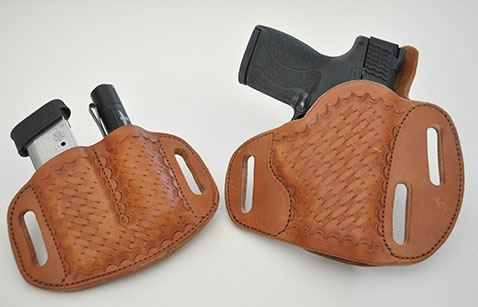 A couple of shooting tips for the Shield are in order. Because the grip portion of the frame is very narrow you may find the pistol trying to twist in the hand. Centering the pistol such that it is aligned with the middle of the wrist and applying a strong, firm grip can eliminate this. It need not be a ”death grip” but you need to hang on if you don’t want the pistol to move in your hand. Too, with these small pistols a loose grip can cause the pistol to malfunction. I’ve also found it helps me shoot these narrow little pistols accurately if I position my trigger finger with the first joint in the center of the trigger. Sometimes called burying the finger into the trigger this helps me press the trigger straight to the rear without moving the sights or moving the pistol in my hand. This takes a little getting used to if you’re a 1911 or target shooter who is accustomed to pressing the trigger with the middle of the fingertip.
A couple of shooting tips for the Shield are in order. Because the grip portion of the frame is very narrow you may find the pistol trying to twist in the hand. Centering the pistol such that it is aligned with the middle of the wrist and applying a strong, firm grip can eliminate this. It need not be a ”death grip” but you need to hang on if you don’t want the pistol to move in your hand. Too, with these small pistols a loose grip can cause the pistol to malfunction. I’ve also found it helps me shoot these narrow little pistols accurately if I position my trigger finger with the first joint in the center of the trigger. Sometimes called burying the finger into the trigger this helps me press the trigger straight to the rear without moving the sights or moving the pistol in my hand. This takes a little getting used to if you’re a 1911 or target shooter who is accustomed to pressing the trigger with the middle of the fingertip.
Finally, you might wonder about the need for a .45 caliber concealed carry pistol. We’re in the middle of another of those dynamic shifts in personal protection perception with the .40 S&W losing favor, only to be replaced by the 9mm. Very few military and police agencies use the .45ACP anymore and the cool kids all shoot 9s. Even so, the .45 has a strong following and Smith & Wesson will sell plenty of Shields. Isn’t it interesting that we’ve come down to the 9mm and .45 as the preferred rounds for personal protection in the modern era, considering the old-timer .45 was invented in 1902 and the “modern” 9mm came out in 1900?
About the Author:
 Ed Head is a regular on Shooting Gallery, Gun Stories and Down Range TV. He has worked for almost 30 years in law enforcement, first in the United States Air Force and then with the United States Border Patrol, retiring as a Field Operations Supervisor. During his Border Patrol career, Ed worked in a variety of patrol, investigative and training capacities. Ed has an extensive background as a firearms instructor, having trained thousands, ranging from beginners to police, military and special operations personnel. Having taught at Gunsite for 20 years, Ed first trained there under the world famous shooting school’s founder, Jeff Cooper, then later ran the school as the operations manager for more than five years. Ed lives in Chino Valley, Arizona, where he continues to teach and write.
Ed Head is a regular on Shooting Gallery, Gun Stories and Down Range TV. He has worked for almost 30 years in law enforcement, first in the United States Air Force and then with the United States Border Patrol, retiring as a Field Operations Supervisor. During his Border Patrol career, Ed worked in a variety of patrol, investigative and training capacities. Ed has an extensive background as a firearms instructor, having trained thousands, ranging from beginners to police, military and special operations personnel. Having taught at Gunsite for 20 years, Ed first trained there under the world famous shooting school’s founder, Jeff Cooper, then later ran the school as the operations manager for more than five years. Ed lives in Chino Valley, Arizona, where he continues to teach and write.

I absolutely agree Ed. Have had mine now for a month love it. Now my primary carry gun great review.